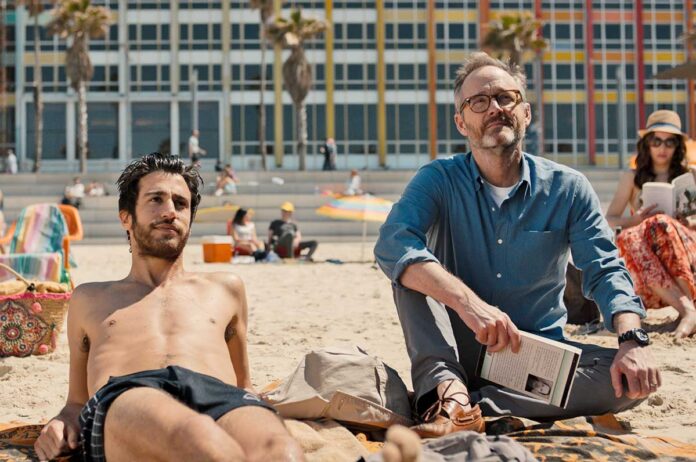Writer/director Eytan Fox’s poignant dramedy, “Sublet,” opening June 11 at the Landmark Ritz Five, has New York Times travel writer Michael (John Benjamin Hickey) arriving in Tel Aviv on assignment “to write about the city as it is.” He sublets an apartment from Tomer (Niv Nissim), a student who makes “artistic horror” films. As Michael settles in to soak up the city, he allows Tomer to stay and act as his guide. As they come to know each other over five days, the very different men exchange impassioned thoughts about monogamy (Michael appreciates it, Tomer resists it); musicals (Michael loves them, Tomer loathes them); and even attitudes about Germany (Michael reflects on the history, whereas Tomer sees a new opportunity). But “Sublet” is best when Michael gets out of his comfort zone. This happens a few times, but it is most affecting during a meal at a Kibbutz with Tomer’s mother (Miki Kam). Hickey gives a wonderfully understated performance, while screen newcomer Niv Nissim exudes charisma.
Hickey chatted about the film in a conversation last November when “Sublet” screened at the Philadelphia Jewish Film Festival. Here are excerpts from that interview.
John, can you talk about how you saw and approached Michael’s character? He is very open to what he sees.
He wants to be more open than he is. Michael considers himself intrepid, but he discovers so much about himself through this young man. I loved this idea of a gay man in his 50s looking at how happy he is in his life despite all that he has been through. Because of what he’s been through, and what the millennials are going through — all this freedom — Michael stands outside his life and knows how fortunate he is to still be here and have all this freedom. Looking at the younger generation, and seeing what’s afforded them, he is standing on the outside, looking in. That’s what I love about Michael; he observes more than he engages, which was a big challenge for me, since I engage more. But you learn about him without being “told.”
You just used the word “intrepid,” which Michael also does. In what ways are you intrepid?
I’m very intrepid in my work. I love to go on adventures. I like to think of jobs as adventures. Sometimes you take them to make some money. Eytan got in touch with me a few years ago with this role in mind. This is my opportunity to immerse myself in a land and culture. The movie is a wonderful, vicarious pleasure — a great substitute for travel. When I think of Tel Aviv and the six weeks I spent there, my journey as an actor paralleled Michael’s trip there. Michael went “tighter” than I did. I went with such abandon! Eating in Tel Aviv — the food is the best I’ve eaten. I gained weight during the movie. When they shot our nude scene, I was like, “Dammit, Eytan!” [Laughs] It’s an extraordinary city and a mass of contradictions and complications and I was drawn to all of it. I’m more intrepid as an actor than a human.
Who has the power in the relationship between Tomer and Michael? They both see something they want in the other — and the dynamic shifts back and forth over the course of the film.
It’s two men trying to figure each other out on very sophisticated levels. It wasn’t about a May-December [romance]; the film has more on its mind than that. They don’t jump each other’s bones. I think Tomer initiates [intimacy]. He becomes the father in that scene. He knows what a balm this will be for both men, how healing it will be. In the other sex scene, where Tomer hooks up with a guy from Grindr, Michael is sitting there in his pajamas and he excuses himself. He’s responsible for his own boundaries, so when Michael lets his guard down, it’s a more poignant and beautiful connection.
Can you each talk about what it means to refract your experience meeting or watching someone else? “Sublet” shows how we see life through someone else’s eyes and experiences.
Like a good travel writer, you don’t see the country through its culture, but through the people. When you meet the person, you meet the country.

